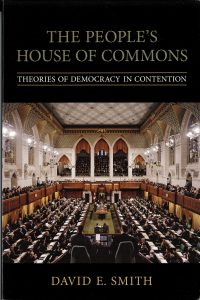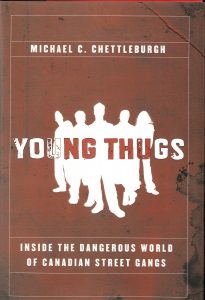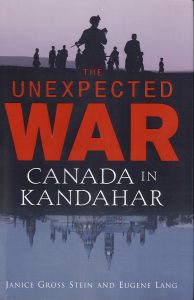Here’s a look back at past winners and the books that made that year’s shortlist. You’ll also find our Jury from each award season.
2007 Winner

The People’s House of Commons: Theories of Democracy in Contention
David E. Smith
(University of Toronto Press)
Through an examination of academic, judicial, political and legal commentary, David E. Smith, one of Canada’s foremost experts in the field of political science, explores the ramifications of many of the changes currently being proposed to Canada’s political system. The People’s House of Commons is a solid study of the House and considers the competing political models and inherent tensions and their affect on public understanding. Smith’s analysis is detailed, reminding readers of the historical foundations of Canadian parliamentary, constitutional and electoral democracy – a must read for political leaders, political aficionados, and members of the public interested in the future of Canada’s parliamentary system.
Runners – up

Enter the Babylon System: Unpacking Gun Culture from Samuel Colt to 50 Cent
Rodrigo Bascuñán and Christian Pearce
(Random House)
Enter the Babylon System is a hard-hitting history of a multi-billion dollar industry and its impact on our popular culture. From the factory floor where firearms are manufactured to the halls of government where laws take shape, to the offices of corporate media where decisions are made to take financial advantage of our enduring fascination with the image of the gun, this book explores the various forms of entertainment that bombard our senses with the seductive allure of violence. The book is an eye-opener and highly informative, providing a rich insight into the nature of gun subculture.

Young Thugs: Inside the Dangerous World of Canadian Street Gangs
Michael C. Chettleburgh
(HarperCollins Publishers Ltd.)
When 15-year-old Jane Creba was caught in the crossfire of a gang battle in downtown Toronto in December 2005, the headlines were filled with the story of how an “American” problem had come to Toronto. The truth is that gangs have been around for many years, and not just in Toronto. They are a homegrown problem infesting cities and towns across the country. Young Thugs exposes how gangs work and what attracts thousands of young Canadians to them each year, from Halifax to Winnipeg to Vancouver, dealing clearly and informatively with a largely ignored issue of importance. Michael C. Chettleburgh writes in an accessible and non-condescending style exploring a range of policy options.

Fueling Our Future: An Introduction to Sustainable Energy
Robert L. Evans
(Cambridge University Press)
Informing the important debate about climate change and energy use, Fueling Our Future provides a concise overview of current energy demands and supply patterns. It presents a balanced view of how our reliance on fossil fuels can be changed over time so that we have a much more sustainable energy system in the near future. Written in a non-technical and accessible style, the book appeals to a wide range of readers without scientific backgrounds. Robert L. Evans reviews policy options in a balanced, analytical style, and he is careful to avoid the trap of assigning the problem’s resolution to only one, or a handful, of remedies.

The Unexpected War: Canada in Kandahar
Janice Gross Stein and Eugene Lang
(Viking Canada)
As Canadian soldiers continue to fight an insurgency unlike any they have encountered before and the country struggles to understand its role both in the war and within the international community’s effort to aid Afghanistan, The Unexpected War provides not only a revelatory narrative but an informed assessment of Canada’s descent into the war. Using gripping language, the book confronts the boiling debate over the appropriate role for Canada, its military and its foreign policy in global security measures. This is a book that is hard to put down: clearly written, fast-paced and enormously informative.
2007 Donner Jury
Grant L. Reuber
Chair
Senior Fellow, C.D. Howe Institute; former Chairman, Canada Deposit Insurance Corporation; former President and Chief Operating Officer and later Deputy Chairman, Bank of Montreal; former Deputy Minister of Finance for Canada; former provost and Vice-President (Academic) of the University of Western Ontario; Officer of the Order of Canada; Fellow, Royal Society of Canada.
Claude E. Forget
Former Minister of Health for the Quebec government; former Chairman of the Commission of Enquiry on Unemployment Insurance; Officer of the Order of Canada.
V. Peter Harder
Peter Harder is Senior Policy Advisor to Fraser Milner Casgrain LLP. Harder possesses a wealth of expertise in public policy as a result of his involvement at the centre of government decision making for over thirty years. Harder was the longest serving Deputy Minister in the Government of Canada. First appointed a Deputy Minister in 1991, he served as the most senior public servant in a number of federal departments including Treasury Board, Solicitor General, Citizenship and Immigration, Industry and Foreign Affairs and International Trade. At Foreign Affairs, he assumed the responsibilities of the Personal Representative of the Prime Minister to three G8 Summits (Sea Island, Gleneagles and St. Petersburg). In 2000, the Governor General presented Harder with the Prime Minister’s Outstanding Achievement Award for public service leadership.
Anne McLellan
The Honourable Anne McLellan joined Bennett Jones LLP after a distinguished career in federal politics, where she served four terms as the Liberal Member of Parliament for Edmonton Centre from 1993-2006. During her political career McLellan was Deputy Prime Minister of Canada, Minister of Public Safety and Emergency Preparedness, Minister of Health, Minister of Justice and Attorney General of Canada and Minister of Natural Resources and Federal Interlocutor for Métis and Non-Status Indians. As Deputy Prime Minister, she chaired two Cabinet committees: the Operations Committee and the Security, Public Health and Emergencies Committee. She was appointed Distinguished Scholar in Residence at the University of Alberta’s Institute for United States Policy Studies in July 2006 and currently is acting director of the Institute.
Denis Stairs
Dr. Stairs is a Professor Emeritus of Political Science at Dalhousie University, a Fellow of the Royal Society of Canada and a past-President of the Canadian Political Science Association. The founding Director of the Centre for Foreign Policy Studies, he was Dalhousie’s Vice President (Academic and Research) from 1988 to 1993. He is currently the Chair of the Board of Visitors of the Canadian Forces College, a Fellow of the Canadian Defence and Foreign Affairs Institute in Calgary, and a member of its Advisory Council, and an Officer of the Order of Canada.

